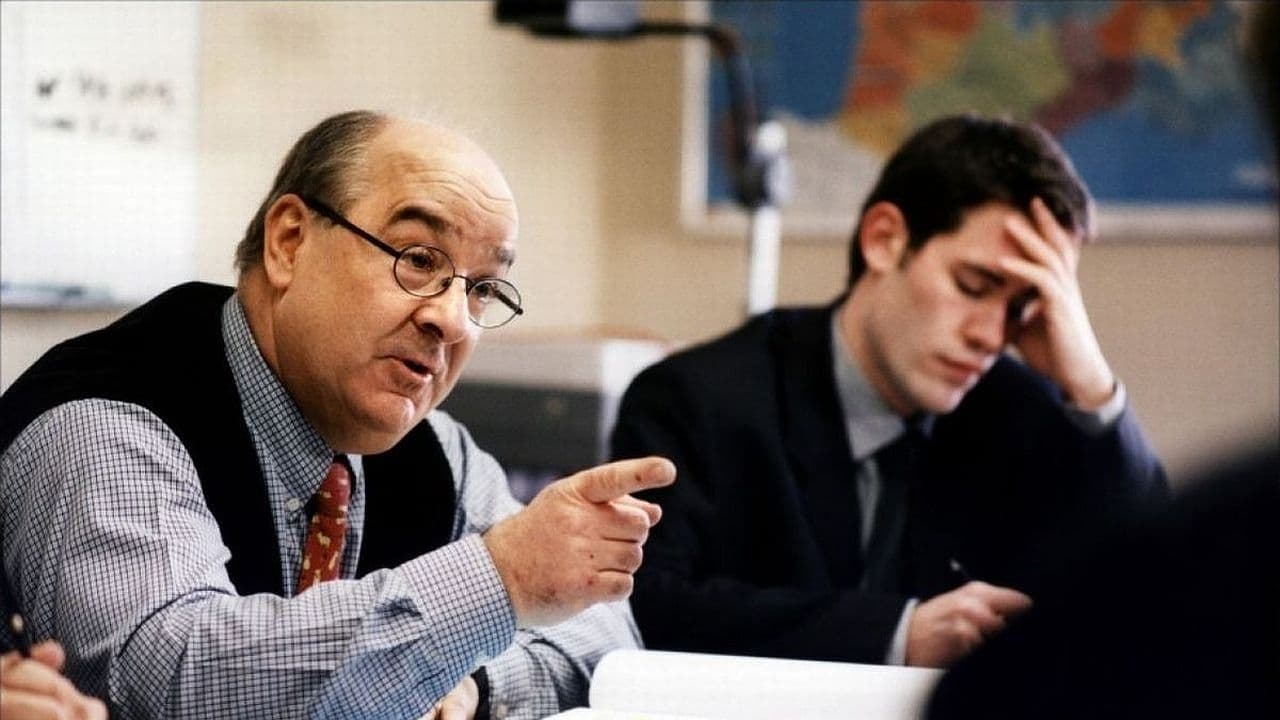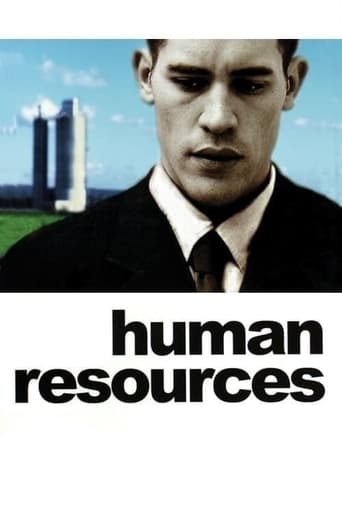

Disappointment for a huge fan!
... View MoreIt isn't all that great, actually. Really cheesy and very predicable of how certain scenes are gonna turn play out. However, I guess that's the charm of it all, because I would consider this one of my guilty pleasures.
... View Moreif their story seems completely bonkers, almost like a feverish work of fiction, you ain't heard nothing yet.
... View MoreThe biggest problem with this movie is it’s a little better than you think it might be, which somehow makes it worse. As in, it takes itself a bit too seriously, which makes most of the movie feel kind of dull.
... View MoreIf you have worked in a hierarchical work environment, you will almost certainly identify with the themes covered; if you haven't, you will be treated to an intimate examination of the complexities of the work environment. The specific situation examined revolves around people working in a small French manufacturing plant, but the themes treated are universally applicable to any workplace. The three basic conflicts are between management and labor (that age-old battle in any capitalist society), between generations, and between stability and adapting to a changing world.Franck is the son of man who has worked in the factory for some thirty years. As the movie starts Franck is returning from being in business school in Paris and he is given a position in the personnel department of his father's factory. Franck rises in the ranks and his father is proud of his success. But serious conflicts arise between Franck and his management and between Franck and his father.I have the feeling that the movie is meant to condemn the way the workers are treated, but I think it details in an almost documentary fashion the inner workings that obtain in almost any workplace. Management is out to worry about the bottom line and the survival of the company and the workers are trying to do their jobs and take home a paycheck. Of course this sets up an inevitable conflict-- both management and labor want as big a share of the pie as they can get, but in that contest management usually has the upper hand. But the success of the company depends on the workers doing their jobs, so attention must be paid to their working conditions.Franck's father's job is running a machine to stamp out metal parts and he is little more than a machine himself; he points out that he can make up to 700 identical parts an hour. On the surface this job looks horribly tedious, but the father seems quite content to run his machine, do his job, and go home. Of course such a job is ripe for automation, and Franck's father is slated for a layoff. I found the beauty of the movie to be in what appeared to me to be an evenhanded and realistic presentation of both sides of the management vs. labor dispute. I could not bring myself to view the company boss as an evil ogre, nor could I pity Franck's father. It was hard for me to sympathize with Franck. In a brutal and heartrending scene between him and his father he expressed his shame for his father and his father's position, a shame that he claimed to have been passed down to him. I felt that Franck should have been proud of his father, a man who had provided him with a home environment to foster his success. And I did not see Franck's father as an unhappy man.This movie is relevant to current (2012) politics in the United States where charges of class warfare abound. The movie explores what I think are inevitable themes that occur in a capitalist society. The themes touched on are so common and deeply significant that it is puzzling why they are so rarely treated in film. What is offered instead is a diet of comic book super heroes, vampires, murder mysteries, fantasies, and so forth.
... View MoreThe movie was so powerful I wondered if things would be better if every corporate executive and politician got to watch it.The movie asserted the importance of treating all people decently without any artificial speeches or distracting overdramatization.Considering that union leaders can be just as flawed and self-serving as any corporate executive, it was inspiring to learn that Arnoux is a real life labor activist in addition to her role here. Some of the best moments (in addition to the father-son relationship) showed how she could quickly forgive people for treating her unfairly in order to work with them for the common good, and how she reached out to the father in a painful moment instead of being absorbed in her own agenda.
... View MoreThis was a positive surprise... I didn't have a clue what to expect when I rented Ressources Humaines, but it turned out to be a great film with fine performances from the cast (especially Jalil Lespert and Jean-Claude Vallod).First, the premise is very interesting. What happen with the family dynamics when the sons and daughters are more educated than their parents? Of course, that is only one aspect of this film's premise. Second, the scene where Franck is yelling at, and blaming, his father is absolutely heartrending. Only a stone wouldn't react to that masterful scene. Third, "entertaining" is hardly the word to describe Ressources Humaines, but I have to say that this film seemed much shorter than tired comedies like Charlie's Angels and Scary Movie.(8/10) Highly recommended.
... View MoreHUMAN RESOURCES / (1999) ***1/2 (out of four)By Blake French: The powerful, heartbreaking new French drama "Human Resources," written by Laurent Cantet and Gilles Marchand, is so authentic the only true professional actor in the cast is Jalil Lespert, who plays Franck, the son of a workaholic. The rest of the performers were chosen from unemployment organizations in regard to the business the characters would have to play. "The title "human resources" is first of all a reaction against the cynicism of that expression," explains director Laurent Cantet in an interview. "A human being is administered the same way you would administer stocks or capital." After watching this film we understand what he means by those words. The working characters employed by a personnel division factory where Franck's dad is currently employed. He has been working there for thirty years and is happier when his son is emotionally further apart from him. Franck has defied his family heritage, went to college, and has recently returned to the French home where his parents live. He gets a job as a manager at the company in which his father works. This is where he becomes torn between business opportunities and staying loyal to his principles of fairness and morality. The people at the factory treat the workers like machines, and it is then when he understands "human resources" refers to people as variables in the production flow graphs. Director Laurent Cantet is not from a working class family, as cleared up in a press kit, so these skillful and wise foreign filmmakers decided to get ideas confirmed by those who did live that life. The parts of the factory workers are played by actual workers; the boss is a real boss; the union leader is a real union leader. The film is also shot in an authentic working factory, as if a documentary was in the creation. Cantet was absolutely correct: who better to imitate the positions and postures of a worker's body bent over a factory machine, or especially the language itself, much of which was selected the workers themselves. The factory's supervisors are cutting back, and Franck gets the privilege of listening to the suggestions that a recent questionnaire asks. The questionnaire is to help make the employers, who are drained of most consciousness on the job, feel they are important to the success of the corporation. Then, while snooping around on the boss's computer, Franck finds the questionnaire is nothing but a pretense for upcoming layoffs, that of which his father is on the list. While Franck is furious at the deceptions, his father refuses to even go on strike after learning of his fate-he is simply to used to consistence and routine, he fears change. The movie is more about the inner struggle between Franck and his father than the actual protesting by the employees or how the factory supervisors fight back. American movies are not often about factory workers, and when they are, the subject is more parody, like in "Officer Space" (1999), than class struggle. One of the best arguments this movie makes is that class struggle is still alive today, and has a high impact of various societies. There are other themes in "Human Resources": greed and power, communication between Franck and his family, the father-son association he has with his boss, finding one's place in society, and shame and regret. "Human Resources" is of the most penetrating films of the year; it offers descriptive writing and empathizing characters. Shot in a documentary style, the direction is focused and sincere, and the performances are mesmerizing. The only thing keeping it from perfection is the somewhat slow-moving script that occasionally strays idle when some of the most important events take place. Beyond that, however, "Human Resources" is a must-see if you are a fan of original, reality theme-based dramas.
... View More